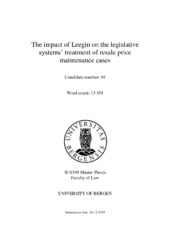| dc.description.abstract | For decades, vertical restraints and especially resale price maintenance (RPM) have been considered anti-competitive in both Europe and the U.S. However, the U.S. experienced a radical change in its antitrust policy, when the U.S. Supreme Court held in Leegin Creative Leather Products, Inc. v. PSKS, Inc. that RPM is subject to the rule of reason rather than per se illegal. Through the years, the change in the U.S. antitrust law has been affected by the development of economic theories, which led to today’s approach in RPM. In contrast, there are debates in Europe about whether RPM should be deemed a hard-core restraint. Even after the policy change in the U.S. and the development in economic theories, in Europe RPM is still considered as anti-competitive under art. 101 (1) TFEU and can hardly be justified under art. 101 (3) of the treaty. This thesis aims to investigate the impacts of Leegin on the European litigation systems’ treatment of RPM cases. Alternatively, the thesis will consider whether the Court of Justice of the European Union (CJEU) should consider RPM on case-by-case basis rather than holding it to be per se illegal. The research is based on an analysis of available European case law since 2007 in both the CJEU and the European Commission. Moreover, the thesis discusses the effects of RPM on the relevant market and consumer welfare based on economic theories and outweigh them with a legal perspective. The data has been collected through three different methods, literature review for legal and economic analysis, a questionnaire developed by the author, and in-depth interviews with several legal scholars. Even though economists and legal scholars argue in favour of the positive effects of RPM on the market and advocate the court for a more flexible regime, the lack of empirical evidence and resources to perform real economic analysis leads the European litigation systems to presume that RPM is anti-competitive and should rarely be justified under art. 101 (3) TFEU. | en_US |
